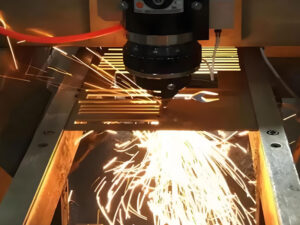PMMA (Acrylic)
Professional PMMA CNC Machining Manufacturer
- Material Certification
- Factory Prices
- No minimum order
Professional PMMA CNC Machining Services
PMMA, or polymethylmethacrylate, is often referred to as acrylic or plexiglass. It is a versatile, transparent thermoplastic that is often used as a glass replacement and is well suited for CNC machining.
Its transparency, impact resistance, stiffness and machinability make it a popular material for precision parts with high dimensional accuracy and optical quality.
Allied Metal brings over 20 years of PMMA CNC machining expertise, equipped with advanced machinery and a skilled team.
Our ISO9001-certified shop handles any custom design, from simple to complex projects.
We offer rapid prototyping, low-volume machining, and high-volume production.
Our precise CNC services include milling, turning, and lathe work, supporting all stages of your product development.

About the material PMMA
Following are the characteristics of PMMA materials:
- High transparency
- Good weather resistance
- Easy processing
- High light transmission
- Easy dyeing
- High dimensional accuracy
- Good mechanical properties
- Non-toxic and low price
Available Materials
PMMA products can be categorized into different grades based on different needs and application scenarios.
The following are some common PMMA grades:
Transparent grade--PMMA
Excellent transparency and optical properties. This is the most basic grade of PMMA and is mainly used for applications requiring high transparency.
Heat-resistant grade--PMMA
Better heat-resistant performance, suitable for environments that need to withstand certain temperature changes.
UV-resistant grade--PMMA
UV-resistant properties, suitable for outdoor, such as billboards and signs.
Flame retardant grade--PMMA
Flame retardant properties, suitable for applications requiring fire protection, such as electronic product shells.
Note: These grades are mainly based on differences in molecular weight, additives, and specific performance requirements.
Applications for PMMA plastic
PMMA (polymethylmethacrylate) has a wide range of applications, including but not limited to the following industry sectors.
light covers, instrument panels, interior decorative parts, etc. may be made of PMMA to achieve lightweight design and improve safety.
PMMA is an important optical material, which can be used to manufacture eyeglass lenses, lenses for optical instruments, light guides for LCD/LED displays, and fiber optic sleeves.
PMMA film is widely used in display technology such as liquid crystal display, touch screen, flat panel TV, etc., as protective film or touch screen panel.
As encapsulation material, insulation material, etc., PMMA is also widely used in electronic components.
Due to its good biocompatibility, PMMA can be used to make artificial joints, dentures, bone cement and other medical implants, prostheses and medical equipment components.
Weather resistance and transparency make it used in construction materials, lighting covers, billboards, signs and so on.
Some airplane windows and cabin components are made of PMMA due to its light weight and high transparency.

Our PMMA CNC Machining Services
Frequently Asked Questions About PMMA CNC Machining
PMMA is a polymer obtained by polymerization of acrylic acid and its esters collectively referred to as acrylic esters, the corresponding plastics collectively referred to as polyacrylic plastics, of which polymethyl methacrylate methyl ester is the most widely used.
Poly(methyl methacrylate), abbreviated as PMMA and commonly known as Plexiglas, is by far the best of the synthetic transparent materials, and is lightweight, inexpensive, and easy to mold, among other advantages.
Yes, PMMA can be CNC machined.
The properties of PMMA such as strength, toughness and transparency make it an ideal material. However, traditional machining methods may not be applicable to PMMA because it is very fragile and any excessive force may result in unwanted breakage. Fortunately, CNC machining offers a safe and reliable method of manufacturing PMMA parts with high precision and minimal waste of edges.
PMMA CNC machining produces very few errors, resulting in high quality PMMA parts and prototypes that are used in a wide variety of applications.
The structural formula of PMMA is -(C₅O₂H₈)ₙ-.
Yes, it can. PMMA has a wide range of applications in several fields due to its good transparency, chemical stability and weatherability. However, PMMA surfaces have poor abrasion resistance, which limits their performance in some applications. In order to improve the performance of PMMA, surface treatments can be applied to improve its abrasion resistance, adhesion and other physicochemical properties.
The price depends on the structure of the part, the order quantity, the machining process and so on. If you have parts to be machined, you can contact us directly for a free quote! E-mail: quote@alliedcn.com
Poly(methyl methacrylate) (PMMA) is a strong but lightweight polymer with a compressive strength of 85-110 MPa and a tensile strength of 30-50 MPa.



